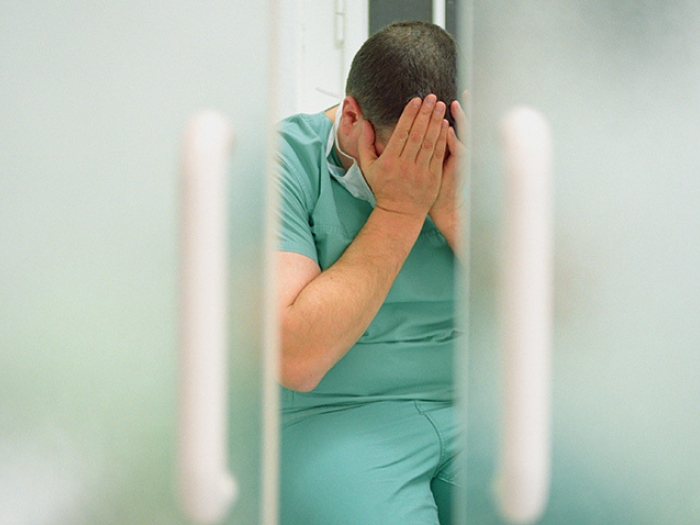A survey of first-year internal medicine residents shows those in programs with longer hours, less faculty mentoring and more research focus had higher depression scores.
7:00 AM
Author |

Nearly 20,000 future doctors will graduate from U.S. medical schools this spring and embark on the residency training to launch their careers. Right now, they're choosing which hospitals and health systems they'd most like to train at.
But a new study suggests that their mental health during the crucial first year of training — called internship — may greatly depend on the nature of the program they enter.
LISTEN UP: Add the new Michigan Medicine News Break to your Alexa-enabled device, or subscribe to our daily audio updates on iTunes, Google Play and Stitcher.
Writing in the journal Academic Medicine, a team from the University of Michigan and the Medical University of South Carolina found that for internal medicine interns, certain program factors were associated with depressive symptoms.
Internal medicine residency programs whose trainees reported the longest working hours, the least helpful feedback from faculty, and the least valuable inpatient training rotation experiences had the highest rates of depression symptoms among their trainees, according to the study.
SEE ALSO: One Medical Student's Mission to Erase the Stigma of Depression
Programs that produced doctors who tended to go on to research-focused careers, as ranked by Doximity, were also associated with increased depressive symptoms.
The researchers documented the effect across several years' worth of yearlong surveys of 1,276 interns in 54 programs across the country who were taking part in the larger effort known as the Intern Health Study.
Disparities in depression
Depression symptoms rose across the intern years, as measured on a standard survey that each intern took before their intern year began, and four times during the year. A composite "depression score" rose on average from 2.3 to 5.9.
That rise was expected. The stress and demands of intern year have previously been shown to be associated with depression, in years of related work led by Srijan Sen, M.D., Ph.D., the senior author of the new paper, and leader of the Intern Health Study. Depression among medical students, residents and practicing physicians has been shown to be associated with career burnout, medical errors, lower quality care, motor vehicle crashes and suicidal thoughts.
But the new paper drills down to see what factors mattered most.
"While most of the focus on resident depression has been on the individual resident, in this paper we show that institutions and residency programs play a critical role," says Sen, the Eisenberg Professor of Depression and Neurosciences at U-M and member of the U-M Depression Center and the U-M Molecular and Behavioral Neuroscience Institute. "Some programs have consistently high rates of depression year after year, while others have consistently low depression. We also find four factors that explain much of the difference between programs."
Mapping the differences
Sen and his colleagues, led by U-M Department of Psychiatry researcher Karina Pereira-Lima, M.Sc., looked at which factors predicted the largest rises in depression scores, and the highest percentage of interns whose scores were above 10, meaning that they met the criteria for having major depression. At least five, and as many as 101, interns from each program participated.
On average, one-third of interns met the criteria for major depression — about what Sen has found in his previous work. But some programs had no interns meet the criteria for depression, while in others, three-quarters of those surveyed met the criteria.
SEE ALSO: 1 in 4 First-Year Residents May Meet Criteria for Clinical Depression
Even when the researchers accounted for factors about the interns themselves that might have made them more prone to depression — such as a history of past depression, childhood stress, a tendency toward neurotic behavior, and female gender — the four residency program factors still stood out as making a difference.
Poor quality and appropriateness of faculty feedback stood out as the most important factor, suggesting that efforts to improve the teaching skills of the physicians who supervise and mentor interns could affect interns' mental health.
Impact of the research ranking
The impact of the research ranking of a residency program was noteworthy and suggests that some of our most prestigious institutions could most benefit from reform, says Sen.
Doximity's rankings are based on the quantity of research papers published by alumni of a particular program, and the number of research grants won by those alumni.
The researchers found no differences between the baseline depression-prone characteristics of interns who chose research-focused residency training sites.
MORE FROM MICHIGAN: Sign up for our weekly newsletter
Rather, they say, the research ranking may be a marker of residency program culture, and of the complexity of the patients that interns care for at research-intensive institutions compared with hospitals that don't train as many future researchers. More study is needed, the researchers say.
"These findings suggest that the residency program environment plays a central role in the mental health of medical interns," says Pereira-Lima, who is also a doctoral candidate at the Ribeirão Preto Medical School of the University of São Paulo in Brazil. "These program-level factors can inform changes to residency programs that may reduce the risk of depression in resident physicians."
Next steps
Sen says that the results of the study have been shared with groups interested in physician and trainee well-being. He and his colleagues are planning further research on residency programs and continue to analyze genetic samples from thousands of participants in the study, to see if they can detect changes over time.
Meanwhile, more than 2,050 current interns are enrolled in the Intern Health Study for 2018-2019, using Fitbit activity trackers and a mood-tracking smartphone app to monitor their sleep, work hours and depression symptoms.
The team is beginning to recruit graduating medical students and others who will begin their intern year this summer at more than 80 sites across the U.S. and China in several types of residency programs. For more information, visit The Sen Lab.
In addition to Pereira-Lima and Sen, the study's authors are U-M medical student Rahael Gupta, who has written in JAMA of her own experience with depression, and Constance Guille, M.D., Ph.D., of MUSC, who has also led research on depression and medical trainees, including a study in JAMA Internal Medicine in 2017 that found that differences in depression symptoms between male and female interns was partly explained by differences in levels of work-family conflict between the genders.
The study was funded by the National Institute of Mental Health (MH101459, MH095109), which supports the Intern Health Study, and by the São Paulo Research Foundation.

Explore a variety of health care news & stories by visiting the Health Lab home page for more articles.

Department of Communication at Michigan Medicine
Want top health & research news weekly? Sign up for Health Lab’s newsletters today!





